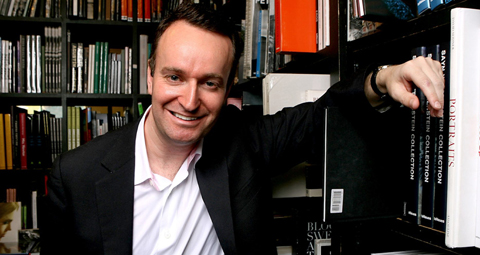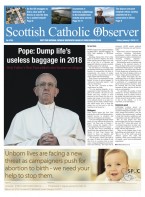December 22 | ![]() 0 COMMENTS
0 COMMENTS ![]() print
print

The secret life of Andrew O’Hagan: a writer’s Catholic childhood
RICHARD PURDEN speaks to the author about the events, past and present, that shape his work -By RICHARD PURDEN
Earlier this year Scottish-born author and journalist Andrew O’ Hagan in his keynote lecture at the Edinburgh International Book Festival spoke of his views concerning post-Brexit Britain. He argued that the UK had ‘mismanaged itself out of existence’ and that Scotland’s future was under threat.
“After Brexit, it seemed overwhelming to many, and not only in Scotland, that Theresa May’s high-handedness and lack of political courage has already compromised Britain’s trading position within Europe,” he said.
Mr O’Hagan took time out to reflect on recent political events as well as discussing the moral and ethical questions of our times. I suggested that the recent lecture reminded me in some ways of a homily—perhaps a throwback to a Catholic childhood in Scotland.
“It’s funny you should hear that and it doesn’t surprise me,” he said. “It was the only occasion in the average working week when an adult would speak sensibly and magically in our lives. My mum and dad were too preoccupied and absent to provide that.
“For working class weans in Scotland, this rhetorical flourish, that would happen once a week, happened at Mass. I liked that part of the Mass because it was about language; there was a degree of uplift and a possibility of enrichment.
“I enjoyed that much more than the recitation parts. When you’re very young you recite without quite realising what the words are. Some priests were good speakers and could be more effective than others. The priest would get his dander up about something and my dander would be up at some points too. The best bits at Mass were when they would tell you off a bit.”
The relationship with Faith which began during childhood continues in various forms, and the writer quotes his late friend, the poet Seamus Heaney, to convey his thoughts on the matter.
“Seamus said that the residue of a Catholic upbringing is there in an individual’s mind,” he said. “Something remains and what remains for me is almost the cadence of that weekly sermon. I don’t have relationships with priests but buildings, yes. I would go to chapel at Farm Street in London. There is a kind of ecclesiastical peace that exists there beyond the bounds of reason or politics. I can step into that at a second’s notice.”
Our conversation turns to the recent lecture about Scotland’s future. The writer has previously railed against more narrow-minded aspects of Scottish society where his experiences as a Catholic from Irish decent informed a different kind of Scottish identity.
Mr O’Hagan was unafraid to speak out against the tribal aspects of Scottish life which often had the potential to create a society of insiders and outsiders. Now in his late 40s and father to a teenage daughter, his views about Scotland have perhaps softened but a palpable Catholic imagination remains.
“There was a reformation in this country and there are many scars spiritually, economically and so on, but the Scotland I prefer is the one with good humour, good nature and fellow feeling right at its centre.
“For me that is a religion—it’s the religion of everyday life. Scotland offers itself as a great exemplar sometimes of how human beings can cosy together. Not always, but that shouldn’t be forgotten either. I spent too much of my earlier career railing against the intolerant aspects but as I get a bit older I feel there is a seam of goodness and careful fellow feeling that we could invest in.
“St Columba and that whole step of bringing Ireland to Scotland and bringing magic in his wake will always appeal to me because it’s in my DNA, it’s in my thinking and my belief system. It has brought into focus a potential for magical thinking and for spiritual transformation. It’s there in writing, when you enter into that space of imagination, contemplation and examination. It’s a sort of spirituality every time—it’s you and the universe.”
His current book The Secret Life: Three True Stories captures the spirit of these times and the age of the internet, examining WikiLeaks founder Julian Assange, Bitcoin inventor Satoshi Nakamoto and the previously unknown Ronnie Pinn.
The latter was a name Mr O’ Hagan discovered on a gravestone and created a new digital identity for. The Glasgow-born writer searches for the truth and humanity in each story and explores the moral problems of created identities.
Mr O’Hagan spoke of the Catholic community’s possible role in this new digital world, still in its infancy. “The Irish/Scots influence on the culture has been mighty not just in sport and politics but also in business and legal culture.
He suggests that a new generation of Scots ‘will be perfectly placed to write the Magna Carta of the internet because all of that is still to come.’
“We are in the Wild West phase of the internet still, the great socialisation and legislator of the world wide web is not here yet,” he said. “I’d like to think that young digital Scots would be in a perfect position not only to embrace it but to also author it and be there as the founding fathers of that new world. That is not something magicked up by me: history is going that way.”
Information and speculation about Artificial Intelligence has become the subject of daily news stories, feature articles and is now part of a global discussion. Ultimately how will it benefit us and what will be the cost to humanity? Andrew O’Hagan suggests that a time will come when we will have to start thinking about moral and ethical questions in relation to created machines.
“It’s too big for now but what happens when these super intelligent machines develop a need for a higher power, higher than the electricity force and higher than the putative owner of the machine?
“That is the stuff of science fiction but it’s also the stuff of near reality. All the original and interesting patents in computer science at the moment are AI and they are about super-intelligent machines that can think for themselves outwith the protocols and instructions of the human owner.
“This will require a Thomas Hobbes, a John Locke and a Thomas Paine discussing the rights of robots. I would imagine there will be questions on the will and soulfulness of these machines.
“It’s the big thing that separates a human being from a computer. I’m not making any predictions on that but it will be a pressing issue and I look forward to it. It will cause us to constantly ask ourselves what is a human being because if a computer is asking for higher wages, better rewards and asking for its fellow intelligent computers, the big take-away question from that is: what is a human being now?
“Do we dispense with kindness and punishment? Do we express a soulfulness exclusively or do we teach those machines how to do that too? Are we those super intelligent machines that were once trying to find a God and asking for rights? That’s when science-fiction becomes a double helix: maybe we are the thing we are conjuring with now.”
In a year which included many tragic events, Mr O’Hagan spoke about the Grenfell Tower fire and what he considered was an insufficient response by the Prime Minister.
“Empathy is one of the great traits of humanity and you send a Prime Minister down there who seems incapable of expressing concern and fellow human feeling to people who have just suffered this terrible event. Whatever you think of Jeremy Corbyn’s politics, leadership effectiveness or management in his own party, he is a guy that knows how to hug someone in distress and there’s a lot to that.
“I want to vote for someone in the end who knows how to put their arms around someone because they have lost family and children in a fire. Theresa May can give a one-nation philosophy of how we are supposed to live, tax and spend money but she doesn’t know how to put a hand out to people in need and she doesn’t have a real sense of fellow feeling for compatriots, whoever was responsible for the fire.
“The fact is there was a fire and the response demands sympathy, kindness and understanding. She brought none of that; she made people feel miserable and bereft.
May comes from a victimising political culture and I hope that is coming to an end. If that means someone like Jeremy Corbyn can provide an antidote to that, that is a natural thing to want, whether or not he is the right person in the end. That’s politics.
“I won’t tell people how to vote but I must say [Corbyn] stood head and shoulders above his Tory opposites and several others when a bit of humanity was required.”
Mr O’Hagan also called for a careful response towards recent terror attacks in the UK and for western powers not to worsen the situation.
“There are forms of hatred now where a street in Paris or a pop concert in Manchester can become a scene of carnage in seconds. These are places where people are living their lives with no connection whatsoever to bullying western democracy, foreign policy or policy from the White House.
“They don’t attach themselves to these questions but they are the ones who are the victims. There is a vigilance and nervousness that is regrettable. We should be 100 years away from that but we bear responsibility and certainly they [the terrorists] do and those who encourage them. I hope we resist turning this into some medieval culture war because that’s where it’s going with what’s been happening in America with events such as banning Muslims from entering the country. That only exacerbates a series of criminal acts into a giant moment and that is much to be avoided.”
– The Secret Life: Three True Stories by Andrew O’Hagan is published by Faber priced £14.99.











